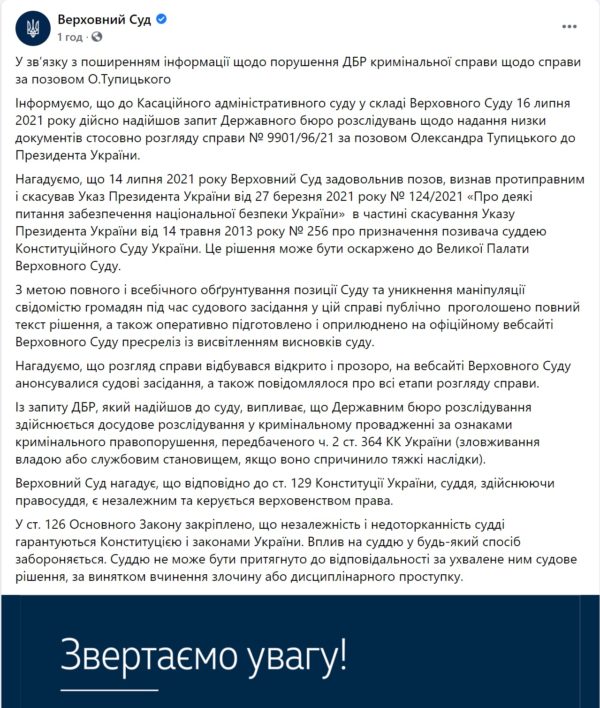The Supreme Court’s press service reported this on Facebook.
‘We inform that on July 16, 2021, the Administrative Cassation Court of the Supreme Court did receive a request from the State Bureau of Investigation to provide a number of documents regarding case 9901/96/21 on the claim of Oleksandr Tupytskyi to the President of Ukraine. On July 14, 2021, the Supreme Court upheld the claim, found it illegal and annulled the Decree of the President of Ukraine of March 27, 2021 № 124/2021 ‘On some issues of national security of Ukraine’ regarding the cancellation of the Decree of the President of Ukraine of May 14, 2013 № 256 on the appointment of Oleksandr Tupytskyi as a judge of the Constitutional Court of Ukraine. This decision can be appealed to the Grand Chamber of the Supreme Court.’
The Supreme Court notes that in order to fully and comprehensively substantiate the court’s position and avoid manipulation of citizens’ consciousness during the trial, the full text of the decision was publicly announced, and press releases covering the court’s findings were promptly prepared and published on the Supreme Court’s official website.
‘The case was heard openly and transparently, court hearings were announced on the Supreme Court’s website, and all stages of the case were reported. From the request of the SBI, which was received by the court, it follows that the State Bureau of Investigation is conducting a pre-trial criminal proceeding according to Part 2 of Article 364 of the Criminal Code of Ukraine (abuse of power or official position, which led to serious consequences).’
The Supreme Court states that in accordance with Article 129 of the Constitution of Ukraine, a judge is independent and guided by the rule of law.
‘Article 126 of the Constitution stipulates that the independence and inviolability of a judge are guaranteed by the Constitution and laws of Ukraine. Influencing a judge in any way is prohibited. A judge cannot be prosecuted for a court decision made by him, except for a crime or a disciplinary misdemeanor,’ the court concluded.


 Creative director of ROA Patrick Stengbye talking about the shoes he chooses for running, what the brand will surprise us with in 2024 and President Zelensky’s style
Creative director of ROA Patrick Stengbye talking about the shoes he chooses for running, what the brand will surprise us with in 2024 and President Zelensky’s style 



